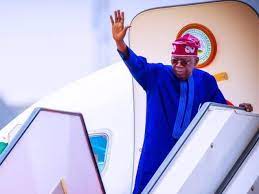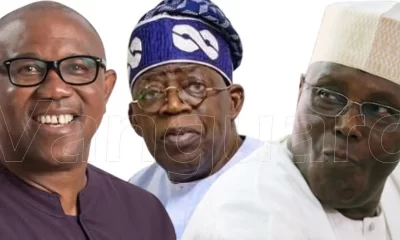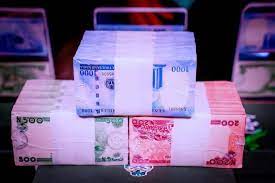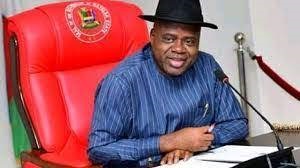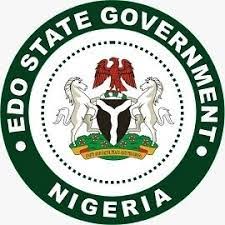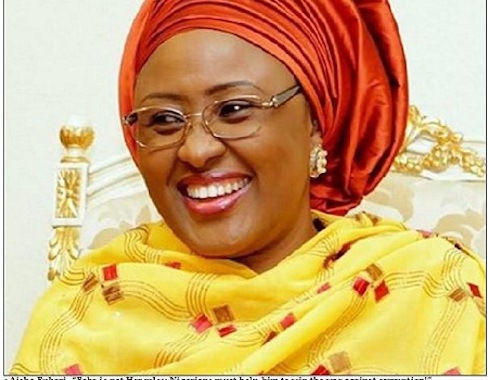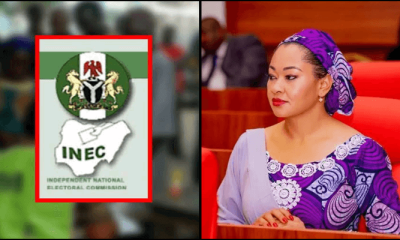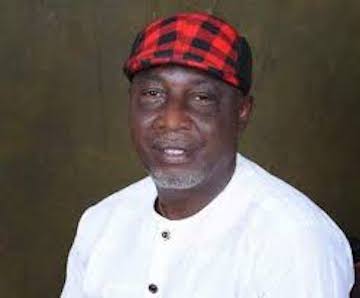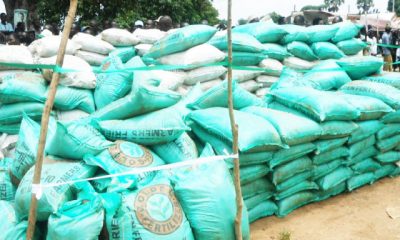OPINION
Igboho’s Cats, Kanu’s Interception and Buhari’s “Language”

By Reuben Abati
When a few weeks ago, President Muhammadu Buhari declared that those who seek to overwhelm and undermine the Nigerian state would soon be spoken to in the language that they will understand, this was immediately interpreted to serve as a signal of a declaration of war against the people of the South-East, because the President spoke in the context of war, as he referred to the civil war of 1967-70.
Subsequently, the President made it clear that the language of engagement would be communicated, not just in the South-East, but in every part of the country, including the North-West and North-East and elsewhere in the country where attempts are being made to sabotage the sovereignty of Nigeria, and the government’s responsibility to ensure the security and welfare of the people.Last week, Nigeria found itself in the grip of a security turmoil, and that promised confrontation with “language.” Nnamdi Kanu, leader of the Indigenous People of Biafra (IPOB), and founder of the Eastern Security Network (ESN), two organisations promoting separatism or secession, and committed to the actualisation of a Republic of Biafra to be carved out of Nigeria, was intercepted, re-arrested/extradited, and rendered Nicodemously, back to Nigerian soil. Nigerians got to know about the operation through a press conference by the Attorney General of the Federation/Minister of Justice, Abubakar Malami (SAN), who disclosed that Kanu was intercepted with the help of intelligence and security services. Kanu was re-arraigned in court on Tuesday, June 29.
The presiding Justice ordered that he should be remanded in the custody of the Department of State Services until July 26. Second incident: In Soka, Ibadan, Department of State Services (DSS) officials stormed the home of Chief Sunday Adeyemo, a.k.a, Sunday Igboho, the Yoruba co-promoter of the idea of an Oduduwa Nation, a modern-day defender of the Yoruba territory against the incursion of criminally-minded Fulani herdsmen into the South-West. The DSS has since declared Igboho a wanted man. He has reportedly said that nobody can intimidate him, because he has not committed any crime and that he is in his house despite the attack on him, his aides and his properties by State Security. Third incident: The brusque manner in which the Nigeria Police put an end to the Yoruba Nation rally at the Freedom Square, Ojota, Lagos, on Saturday, July 3. Not only did the Police block the people’s right to protest (which is condemnable), the life of a young lady was snuffed out, according to one account, by a stray bullet, but the police insist that she died from a knife-stab. She did not deserve to die.
These three incidents can be taken as an indication of “the language” that the President recently spoke about. It is the language of power, in form of an affirmation of the supremacy of the state. The only problem is the politics of it, the tone, nature and fall-outs and how the Nigerian government is doing the right thing in a wrong, untidy and controversial manner. What is right? And what is wrong? The Buhari administration has consistently insisted on the sovereignty of Nigeria, its indivisibility and indissolubility, in line with the Preamble of the 1999 Constitution and Section 2(1) thereof, in addition to its resolve to uphold the same principles and provisions. In the face of calls for secession, restructuring, and a referendum on the future of Nigeria and the state of the Union, government spokespersons have argued that whereas the Constitution can be amended, and the country can be restructured, as the people wish, this has to be done through the legislature, and not outside the extant constitutional framework. Those who insist that the 1999 Constitution is a “military invention” and not a “Peoples Constitution” have also been told that the latter, which they seek through a referendum, without the National Assembly, would amount to an unconstitutional proposition. There is no provision for a people’s referendum, or any contemplation of secession or separation by any part of the Federation known as Nigeria, in the 1999 Constitution.
This is the source of the difference between the separatist groups led by the likes of Chief Sunday Adeyemo and Nnamdi Kanu and other ethnic nationalists. The latter argue that Nigeria’s 1914 amalgamation has since expired and given that government is not prepared to re-negotiate the terms of the union, in the face of so much injustice, mis-governance and inequity in the land, it is better for those aggrieved groups within the federation to re-define their own destiny. Self-determination is a universally recognised right under Articles 1(2) and 55 of the United Nations Charter. The Nigerian government has been careful not to openly use that phrase, self-determination, but it rails against any effort to achieve that objective through the means of violence, or deliberate mobilisation to undermine Nigeria. “No responsible government will fold its arms” and allow non-state actors to overwhelm it is the common phrase we hear. Or something like the government’s responsibility to defend the rule of law or that the unity of Nigeria is non-negotiable. This is, of course, readily dismissed as hypocritical by those who accuse the Nigerian government of having no regard whatsoever for the rule of law, and hence no moral high ground to stand upon.
Sunday Igboho is committed to the actualisation of an Oduduwa Nation, which means the South-West of Nigeria pulling out of the Nigerian federation. He also defends the Yoruba territory. He has led rallies across the South-West, in Ibadan, Osogbo, Akure, Abeokuta, Ado-Ekiti, to sensitise and mobilise the people. The proposed Oduduwa Nation has its own anthem and a national flag. The latest rally was scheduled for Lagos, July 3. Two days earlier, the DSS attacked Igboho’s residence in Ibadan in the middle of the night. In the case of Nnamdi Kanu, he had been arrested by the Nigerian government in 2015, and taken to court on a nine-count charge of treasonable felony and other offences. IPOB, which he leads, was later proscribed and declared a terrorist group. In April 2017, Kanu was granted bail, under strict conditions. In September 2017, he jumped bail and became a fugitive from the law. He was declared wanted.
While on the run, Nnamdi Kanu and his associates sustained an attack on Nigeria through propaganda and other organised activities in the South-East. Without doubt, both Igboho and Kanu had become persons of interest to the Nigerian state. Igboho had been invited in the past by the police. There was also an unsuccessful attempt by state agents to kidnap him on the Lagos-Ibadan Expressway on one occasion. Igboho has remained undeterred. He has pursued his Yoruba Nationalism with gusto. It is not beyond the state to take an interest in him. As for Kanu, what the state has proven in his case is that whereas the will of the state may be slow, it will eventually prevail, and that nobody is above the laws of the land. The argument that Kanu is a British citizen offers neither a defence or immunity under the law. Dual nationality, which Nigerian laws recognise, does not grant anyone the right to or seek to overwhelm the Nigerian state and expect the affected state to look the other way.
What is wrong is how Nigeria has handled the two cases in question. Igboho’s house was attacked in the dead of the night, ostensibly without prior notice, in a Gestapo style reminiscent of those locust years of military dictatorship. The DSS claims that its team was attacked as it approached Igboho’s residence. So? In the absence of any prior notice, the DSS team could well have been regarded as intruders coming to do harm. Given his circumstances, any reasonable person would expect Igboho to have security arrangements at his home to keep intruders out. Did the DSS officials identify themselves before approaching the house, like the use of a public address system, asking Igboho to surrender himself? In trying to assert the might of the state, the DSS adopted extra-legal tactics. Two persons were killed, including an aide who was reportedly on a praying mat. Wives, including Igboho’s wife, were carted away, but released later. 13 persons ended up in custody. The vehicles in the compound were sprayed with bullets and damaged. This certainly cannot be a standard security agency operating procedure. DSS said it was acting on a tip off that Igboho was stockpiling arms in his home. The man says the few arms and ammunition that have been paraded do not belong to him. He is a traditionalist he insists, who deploys metaphysical powers. The DSS team was looking for arms, but they also ended up killing and arresting Igboho’s cats. Cats! Ologbo Iya agba. Ologbo Ijeun. Meow, Meow. Pussy Cat. How ridiculous. Did the cats also resist the invasion of Igboho’s residence?
The international community must be having a good laugh at Nigeria’s expense about this cruelty to animals and the ethno-theological assumption that it is possible for Sunday Igboho, a human being, to turn into a cat to escape arrest. The US SEAL team came all the way to Nigeria in October 2020, on a special security operation to rescue a 27-year-old Philip Walton, who had been kidnapped in Niger and brought to Nigeria. It was a precision operation, driven by science and professionalism. Nigerian security agents are always busy looking for fetish objects. Many of our own security agents will be better off joining the Vigilante, the Amotekun, the hunters’ guild or Ebube Agu. Igboho’s cats have not yet been paraded by the DSS. Those cats should also be allowed to have their day in court and their charges properly read out to them. I have no doubts that there will be more than enough lawyers who will take up their matter, pro bono, to make the simple argument that under Nigerian laws, an animal is not a juristic entity. Until that matter is determined, nothing must happen to those cats. Everything must be done to ensure that they do not end up in anybody’s pot of soup as a captured delicacy and spoil of war!
It is this same sloppiness that we have seen in the Kanu case. Ordinarily the matter should not have generated any controversy at all. A man runs away from the law. The law catches up with him. Simple. He should have his day in court. But the whole thing has been turned into something else because of the lack of clarity about the circumstances of his arrest. The Nigerian government has not even disclosed how and where he was arrested, the international agencies or governments that provided support, and how he was brought back into the country. The secrecy has now given room to needless speculation, confusion, and conspiracy theories. The Kenyan authorities have said, for example, that he was not arrested in Kenya. Persons close to him insist that not only was he arrested in Kenya, he was also tortured by Kenyan officials before he was handed over to the Nigerian authorities. By doing the right thing wrongly, the Nigerian government is gradually turning the narrative against itself, and turning both Igboho and Kanu into heroes among their supporters, and across ethnic constituencies in the South and the Middle Belt. We have now reached a point whereby Nnamdi Kanu’s supporters in the South-East are supporting and defending Sunday Igboho of the South-West and vice versa.
The emerging conversation is gradually focussing on due process, the right to self-determination and why in speaking language to power, the Nigerian state has not deemed it necessary to arrest anyone involved in attacks on the sovereignty of Nigeria in the Northern parts of the country. Questions: Can the point be confidently made that it is only in the South that non-state actors challenging the integrity of the state can be found? How about the Boko Haram and ISWAP in the North-East and the bandits in the North-West? Only yesterday, Boko Haram reportedly appointed a governor of its own to oversee parts of Borno State. Why is the government not going after whoever is the so-called Boko Haram governor? Will he appoint commissioners too and collect tax? Why are Boko Haram terrorists being approached for negotiation and offered chances of rehabilitation, unlike agitators in the South? These are the kind of questions being raised. No government that expects to be taken seriously can afford to lay itself open to such charges of double standards. Other commentators have gone further to insist that what needs to be addressed are the specific issues that continue to throw up non-state actors who question the value of the Nigerian state: these are issues of equity, fairness, justice, good governance and ensuring a collective sense of ownership and belongingness among Nigerians, not through vapid rhetoric but concrete actions. It is not an accident that these latter points are captured in spirit, in the communique issued at the conclusion of the meeting of the 17 Governors of Southern Nigeria held in Lagos on Monday, July 5.
The Federal Government of Nigeria needs to manage the crisis of confidence it faces. It needs to rebuild trust. It can start by ensuring that the right things are done in an open and just manner, that is fair to all parties concerned. And the security agencies must play their own part by always acting professionally. On Saturday in Lagos, a young lady who was not even part of the Yoruba Nation rally lost her life. In less than 24 hours, the Lagos Police Command told the public that no policeman fired any shot at all (something that was seen on television!), and that the victim did not die as a result of gunshot wound (did the police carry out an autopsy to determine the cause of death so fast?). State officials must learn to be truthful, otherwise whatever they do or say will be politicised and treated with doubt and suspicion.
Reuben Abati, a former presidential spokesperson, writes from Lagos.
OPINION
Buhari: Lessons in Leadership and Patriotism

By Ismail Abdulaziz
On July 13, retired Maj.-Gen. Muhammadu Buhari, former President of Nigeria, passed away after the mid-day prayers at a London Clinic at the ripe age of 82.Many testimonies about his life and times indicate a man of civility, discipline and patriotism not adding his avowed principle of living a Spartan life and commitment to eradication of corruption.
President Bola Tinubu, paid a glowing tribute. ‘’Buhari was to the very core, a patriot, a soldier, a statesman; his legacy of service and sacrifice endures.“He served Nigeria with unwavering dedication, first as a military leader from January 1984 to August 1985, and later as a democratically elected President from 2015 to 2023; duty, honour, and a deep commitment to the unity and progress of our nation defined his life.“He stood firm through the most turbulent times, leading with quiet strength, profound integrity, and an unshakable belief in Nigeria’s potential.“He championed discipline in public service, confronted corruption head-on, and placed the country above personal interest at every turn,’’ the president said.Similarly, the revered Islamic scholar, Mufti Ismail Menk, said Buhari was an upright man, who never missed his prayers and a very disciplined believer who served his people to the best of his ability.“His name was synonymous with integrity.“He was definitely one of those who made me develop a much better perception of Nigerians as a people,’’ he said.The U.S. Mission in Nigeria also condoled with Nigeria.“Buhari was a leader whose life was defined by service, discipline, and a commitment to restore integrity to public office.“His legacy includes his efforts to strengthen Nigeria’s democratic institutions,’’ it said.The Chinese embassy in Nigeria also expressed its condolences.‘’We mourn a resolute leader whose unwavering dedication to Nigeria’s unity and progress leaves an enduring legacy.“His pivotal contributions to advancing China-Nigeria relations will forever remain etched in our shared history,’’ it said.Former President Olusegun Obasanjo, who was also a former military Head of State like Buhari, said the late president was a comrade, a cool patriot, who as a soldier, played his role.“As an administrator, he played his role as an administrator; as a statesman, he played his role as a statesman.“At a time like this, we need the totality of the experience and what I may call statesmanship of all those who have had opportunities to run the affairs of this country to get us out of the situation we are in; he will be sorely missed; may his soul rest in perfect peace,” Obasanjo said.Tributes have also come in from the Ethiopian Prime Minister Abiy Ahmed Ali, Sierra Leone President Julius Maada Bio as well as World Trade Organisation Director-General Ngozi Okonjo-Iweala.During his campaign in 2015, something spectacular happened.The masses of Nigeria decided to contribute their widows’ mites for his success.What else can a human want than the general believe in his capacity and ability to lead them to the Promised Land?This singular act was a burden placed on him by the people to rectify the past.Analysts say the history of Nigeria will be replete with the roles Buhari played during his three terms leading the country.First, as a military head of state and subsequently, as a democratically elected president between 2015 and 2023.For history to be kind to him, the testimonies of those around him during his time will shape the final options.As an elder statesman, Ibrahim Badamasi Babangida once said: “History will be kind to you for taking a decision, but will never be kind to you for not taking a decision.”Buhari accepted most of the mistakes he took while serving the people as exemplified in one of his statements in the course of his handing over the reign of leadership to President Tinubu.“Whoever thought that there has been some form of injustice on him we are all humans, there is no doubt I hurt some people, and I wish they would pardon me and those who think that I have hurt them, please pardon me.”The man that peacefully handed over power to Buhari, former President Goodluck Jonathan, has some comforting words.‘’He will be remembered as a courageous leader, a disciplined officer, and a committed public servant who made considerable contributions towards the peace and progress of our dear nation.“The late President was deeply admired across the strata of society for his decency, integrity and exemplary life of service.“As a leader, he was selfless in his commitment to his duty and served the country with character and a deep sense of patriotism.‘’In his passing, Nigeria has lost one of its foremost leaders, and I have lost a respected colleague and elder.“His legacy will continue to endure in the hearts of all who value sacrifice, integrity, perseverance and devotion to national ethos,’’ Jonathan said.Buhari was born on Dec. 17, 1942 in Daura, Katsina State to Adamu and Zulaiha Buhari.He was raised by his mother, following the death of his father when he was about four years old; he had his primary school education in Daura and Maidua from 1948 to 1952, before proceeding to Katsina Middle School in 1953.He joined the Nigerian Army in 1961 when he was admitted to the Nigerian Military Training College, Kaduna.Buhari underwent Officer Cadets training at Mons Officer Cadet School in Aldershot, England from 1962 to 1963, and was commissioned as Second Lieutenant in January, 1963.He attended the Nigerian Military College, Kaduna for the Platoon Commanders’ Course from 1963-1964Buoyed by a deep sense of patriotism and commitment to national service, Buhari entered politics in 2003, following Nigeria’s return to a democratic dispensation in 1999.Buhari joined the All Nigeria People’s Party (ANPP) and contested the presidential election on its platform that year.He lost to the presidential candidate of the People’s Democratic Party (PDP) Olusegun Obasanjo.Undeterred by defeat, Buhari continued his political struggle, and on Dec. 18, 2006, he emerged as the consensus presidential candidate of the ANPP for the 2007 elections.His main challenger in the April 2007 presidential polls was the ruling PDP candidate, Umaru Yar’Adua.In the election, Buhari officially scored 18 percent of the total votes cast, against 70 percent for Yar’Adua.In March 2010, Buhari left the ANPP and formed, with some of his supporters, the Congress for Progressive Change (CPC).Buhari was nominated as the CPC presidential candidate on April 16, 2011 for that year’s general election.He ran against the then incumbent, President Jonathan of the ruling PDP, Malam Nuhu Ribadu of the Action Congress of Nigeria (ACN), Ibrahim Shekarau of the ANPP, and other candidates of smaller parties.Using the platform of the CPC, a newly formed party, Buhari was able to garner 12, 214, 853 votes, coming second to Goodluck Jonathan of the Peoples Democratic Party(PDP), who polled 22, 495, 197 votes.In 2015, under the platform of the All Progressives Congress (APC), Buhari won the presidential elections of March 28, defeating the incumbent Jonathan of PDP.He was sworn into Office as President, Commander-In Chief of the Armed Forces, and Federal Republic of Nigeria on May 29, 2015.After eight years in office, Buhari ensured a smooth transition process; in May 29, 2023, he handed over power to President Bola Tinubu who was also elected under the platform of APC in the February, 2023 presidential election.(NAN)OPINION
Naira Spraying Crackdown: Cultural Policing or Economic Necessity?
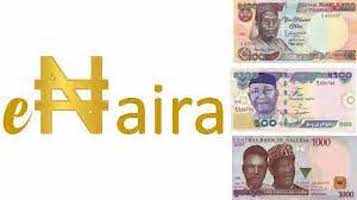
In recent months, Lagos has witnessed a sharp intensification of the crackdown on spraying naira notes at social events, with the Economic and Financial Crimes Commission leading enforcement efforts to uphold currency integrity.In April 2025, popular Lagos socialite Emeka Okonkwo, known as E-Money, was arrested for allegedly spraying both naira and US dollars at public gatherings, an act that violates Nigeria’s currency laws.
In the same month, two social media influencers, Tobilola Olamide (TobiNation) and Peter Olaitan (TDollar), were convicted and sentenced to six months imprisonment or a fine for spraying naira notes at a Lagos event, based on viral TikTok videos that triggered EFCC investigations. These cases underscore the government’s renewed commitment to enforcing the Central Bank Act provisions against currency abuse, amid growing concerns over inflation and economic stability.Beyond Lagos, notable Nigerians have also faced arrest and conviction for spraying naira under the Central Bank Act. Idris Okuneye (Bobrisky) was convicted in April 2024 and sentenced to six months’ imprisonment after his March arrest for spraying at Lagos events.Actress Oluwadarasimi Omoseyin was arrested in February 2023 for spraying and stepping on new naira notes at a wedding in Lagos, receiving a six-month jail term with an option of a fine. A makeup artist, Abdullahi Huseini (Amuscap), was sentenced to six months’ imprisonment in Kano for spraying at his wedding. Cubana Chief Priest was also arrested, etc.We praise the EFCC and the government for doing a great job of protecting the integrity of the naira by ensuring that abusers are punished. We wish and pray that the same swiftness and assurance of convictions be visited on other issues, such as political corruption and insecurity.According to a report by Daily Post 2021, Mr Akin Adewale from a first-generation bank said it was good so that money would not be devalued. What the CBN said was that it spent a lot of money printing it, and the cost is passed on to the economy in the long run. He said, “If the money is rough or torn, its life span is reduced, and printing becomes more frequent, which leads to inflation.”Any person who has been in the country since 2021 will know that the devaluation of the Nigerian currency is closely related to inflation.But what about the cultural significance of spraying money among Nigerian communities?To criminalise spraying money without acknowledging its cultural weight risks violating the social rhythms that bind communities together.In Yoruba culture, spraying money is a revered symbol of honour and respect. It is a way to publicly celebrate and support the success and status of loved ones, affirming social bonds and communal pride. For the Igbo, spraying is an expression of joy and solidarity, a ritual that marks milestones and reinforces communal support. Among the Hausa-Fulani, though less common, similar acts of generosity during celebrations symbolise goodwill and social harmony. The same is also true of many other ethnic groups in the country.Beyond mere festivity, spraying money is a powerful social symbol; it represents abundance, generosity, and the collective sharing of fortune. It is a language of respect, a way to uplift individuals while strengthening community ties. To clamp down on this practice without sensitivity is to risk eroding a cherished cultural expression that nurtures social cohesion.No doubt, many countries have laws prohibiting the mutilation or defacement of currency to protect their integrity. Singapore, Sri Lanka, Australia, the United States, the United Kingdom, and Canada all enforce penalties, ranging from fines to imprisonment, against damaging their money.These regulations reflect a global consensus that currency is both a medium of exchange and a national symbol essential for economic stability. It means Nigeria’s Central Bank Act similarly criminalises currency abuse, including spraying naira notes, to safeguard the naira in line with the value that other nations of the world uphold.By implication, therefore, the culture of enjoying money spraying as a social bonding avenue is an aberration that followed normal political impunity in Nigeria. It’s not really a piece of culture rooted in African cosmology.Political and class dimensions also raise concerns about selective justice and unequal treatment of the elite versus ordinary people. Many countries indeed criminalise the mutilation or defacement of currency to protect its integrity, and Nigeria’s Central Bank Act follows this global practice by outlawing acts like spraying naira notes. However, this raises a deeper question: is criminalising currency abuse more important than implementing policies that genuinely uplift the lives of Nigerians?One must wonder whether the Nigerian government’s crackdown is driven by a sincere commitment to economic reform or simply an attempt to imitate other nations without addressing more pressing issues. It is normal for governments to prioritise certain policies, but if the focus is on enforcing currency laws, then why has there been so little progress in prosecuting terrorists, corrupt officials, or those who steal public funds? Why are governors and government officials rarely held accountable under the law, including the Bank Act?For instance, an online report showed that Thomas Ekpemupolo, known as Tompolo, a former Niger Delta militant leader, was caught in a viral video from his April 54th birthday celebration dancing while N1,000 notes were sprayed and stepped on, actions considered naira abuse under Nigerian law.Following public outcry, the EFCC vowed in May to investigate and hold him accountable, stressing, “Nobody is above the law.” As of late June, there has been no public update on his arrest or arraignment. If the case of the former Niger Delta militant leader could go this way, how about when a governor or senator is seen committing such an offence? Yet the government ought to look into a balanced approach to naira spraying.No one is in support of mutilating the currency, but a balanced approach to the naira spraying crackdown could help preserve cultural heritage while protecting the currency’s integrity. One solution is public education to raise awareness about the legal restrictions and the economic impact of currency mutilation, encouraging celebrants to handle naira notes with care rather than abandoning the tradition altogether.Additionally, regulated practices could be established where spraying is done respectfully and with minimal damage, such as using designated fresh notes or limiting the amount sprayed, distinguishing between cultural honour and currency abuse. This middle ground respects the ritual’s social significance while aligning with legal and economic concerns.Outright bans risk alienating communities and eroding cultural identity, whereas education, innovation, and sensible regulation offer a path to harmonise tradition with the imperative to protect Nigeria’s fragile economy.Most importantly, instead of merely emphasising the sanctity of the naira, Nigeria should strive to uphold the true rule of law, ensuring justice, fighting corruption, and protecting citizens, just as many other countries do. Without this broader commitment, focusing solely on currency integrity risks appearing superficial and disconnected from the urgent needs of the people.Dr Mbamalu, a Jefferson Journalism Fellow, member of the Nigerian Guild of Editors and media consultant, is the publisher of Prime Business AfricaOPINION
Two Sides of Late Major General Muhammadu Buhari

The late Major General Muhammadu Buhari, who famously overthrew the government of Alhaji Shehu Shagari, struck like a thunderbolt. His death, announced yesterday, July 13, 2025, shocked the nation, especially as he appeared healthier than when he was elected President of Nigeria in 2015.
In reflecting on his life and legacy, it is essential to compare the two distinct eras of Buhari’s leadership: first as a military ruler and later as a democratically elected president. As a military president, Buhari was often perceived as a no-nonsense leader who implemented significant reforms that impacted the political, economic, and social landscape of Nigeria. His initiatives included:i. War Against Indiscipline;ii. Import Substitution Industrialization Policy;iii. Go Back to Land Programme; andiv. Foreign Policy InitiativesThe announcement of his coup triggered panic among second Republic politicians, who went into hiding, fearing the unknown. Their concerns were not unfounded; the brutal orders that followed forced many into detention without trial for extended periods. While these policies are attributed to General Buhari, some believe they were largely orchestrated by General Tunde Idiagbon, his Chief of Staff, a bold and incorruptible officer who played a crucial role in implementing Buhari’s agenda.Ambassador Lawal Rafindadi, the Director General of the National Security Organization (NSO), also significantly influenced Buhari’s policies. Under his leadership, the NSO detained numerous Nigerians and a few foreigners without trial, while also investigating high-profile corruption cases, including that of Umaru Dikko.Buhari’s name incited a mix of fear and admiration among Nigerians; while his policies benefitted many, they caused distress for others. There is a prevailing belief that Idiagbon and Rafindadi were the true engines of governance during Buhari’s regime. His subsequent overthrow by General Ibrahim Babangida and the ensuing years of incarceration were reminiscent of the betrayal faced by Julius Caesar.When Buhari returned to power as the elected president in 2015, many Nigerians expressed hope that he would revive the transformative policies of his military rule. However, the reality was starkly different; the economy continued to plummet, corruption surged, and social cohesion deteriorated.This raises the question: Were the key figures who had previously supported Buhari—such as Tunde Idiagbon and Lawal Rafindadi—absent during his second tenure? Observing Nigeria’s political and economic landscape at the time, one might conclude that the nation had made progress in governance compared to Buhari’s first administration. Yet, familiar advisers from his earlier days remained influential, including figures like Malam Maman Daura, the late Mamud Tukur, Alhaji Magaji Danbatta, Professor Ango Abdullahi, and General Aliyu Gusau.Some critics have suggested that Buhari’s second coming could be summed up by the adage “once bitten, twice shy.” Rumor has it he confided to close friends that, in his youth, his aspirations to save Nigeria were thwarted; thus, he was unwilling to dedicate his later years to a country that had not recognized his contributions.Despite this backdrop, Buhari’s integrity remained intact. He personally rejected corruption; however, it appeared he overlooked the corrupt practices of those around him. His presence will be missed as a Nigerian statesman capable of fostering stability in various regions. His immediate family and allies will mourn his passing, as will many Nigerians who knew him well.As we ponder Buhari’s legacy, it remains unclear how history will ultimately judge him. Will he be remembered with fondness or skepticism? Only time will tell, as historians analyze his contributions and their impact on Nigeria.Simon Shango MFR writes from Abuja
